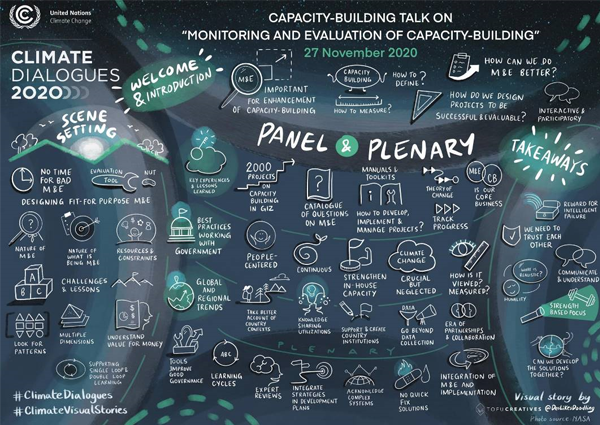ประเด็นสำคัญจากการสัมมนา “Climate Dialogue 2020: Monitoring and Evaluation Capacity Building”
“การพัฒนาศักยภาพ” เป็นพื้นฐานสำคัญในการที่จะทำให้แต่ละประเทศสามารถบรรลุข้อตกลงปารีส หรือ Paris Agreement ได้ และมีความสำคัญเป็นอันดับต้นๆ ในเป้าหมายการลดก๊าซเรือนกระจกของประเทศ (Nationally Determined Contribution: NDC) เพื่อเพิ่มประสิทธิผลในการพัฒนาศักยภาพที่เกี่ยวข้องกับการเปลี่ยนแปลงสภาพภูมิอากาศ กิจกรรมการดำเนินงานต่างๆ ที่มีกิจกรรมด้านการพัฒนาศักยภาพจำเป็นที่จะต้องมีการตรวจสอบและประเมินผลได้อย่างเหมาะสม การติดตามประเมินผลโครงการด้านการพัฒนาศักยภาพจึงมีความสำคัญต่อความสำเร็จของโครงการหรือกิจกรรมนั้นๆ ผ่านการวางแผนที่ดีและเหมาะสม มีการจัดสรรทรัพยากรอย่างมีประสิทธิภาพและประสิทธิผลที่เพิ่มขึ้น
การสัมมนาในหัวข้อ “Monitoring and Evaluation Capacity Building” ซึ่งเป็นส่วนหนึ่งของงาน UN Climate Change Dialogues 2020 หรือ Climate Dialogue ซึ่งจัดขึ้นในระบบออนไลน์ เมื่อวันศุกร์ที่ 27 พฤศจิกายน 2563 ที่ผ่านมา โดยอนุสัญญาสหประชาชาติว่าด้วยการเปลี่ยนแปลงสภาพภูมิอากาศ หรือ United Nations Framework Convention on Climate Change (UNFCCC) เพื่อนำเสนอตัวอย่างหรือแนวปฏิบัติที่ดี ข้อมูลเชิงลึกที่สำคัญ และแลกเปลี่ยนประสบการณ์ในการดำเนินงานด้านการพัฒนาศักยภาพด้านการเปลี่ยนแปลงสภาพภูมิอากาศ
ในการเสวนาดังกล่าวได้มีการนำเสนอถึงการออกแบบการติดตามและประเมินผลที่เหมาะกับวัตถุประสงค์ซึ่งได้แก่
- ลักษณะของการติดตามและประเมินผล ที่ต้องคำนึงถึงผู้ใช้หลัก ระยะเวลาของการติดตามและประเมินผลเมื่อเทียบกับการดำเนินงาน (ก่อน ระหว่าง หลัง) และคำถามที่จะใช้ในการประเมิน
- ลักษณะของสิ่งที่เกิดระหว่างการติดตามและประเมินผล อาทิ ผลลัพธ์ว่าสามารถคาดการณ์ได้ดีเพียงใดและจะบรรลุได้อย่างไร ผู้ที่มีส่วนเกี่ยวข้องที่ทำให้เกิดผลลัพธ์ ระยะเวลาที่ล่าช้าก่อนที่จะเกิดผลลัพธ์ที่ชัดเจน เป็นต้น
- ทรัพยากรและข้อจำกัด อาทิ ปริมาณ คุณภาพ และความเกี่ยวข้องของข้อมูล เวลา เงินทุนที่ได้รับการสนับสนุนจากภายนอก ความตั้งใจและการสนับสนุนจากผู้มีส่วนได้ส่วนเสีย อุปสรรคในการมีส่วนร่วมและการเดินทาง เป็นต้น
นอกจากนี้ประเด็นที่ได้มีการหารือร่วมกันคือบทเรียนและความท้าทายที่ต้องให้ความสำคัญ อาทิ ยังมีข้อคำถามที่เกี่ยวกับการพัฒนาศักยภาพที่ประเทศกำลังพัฒนาจำเป็นจะต้องคำนึงถึง เช่น คำจำกัดความหรือความหมายของคำว่า “การพัฒนาศักยภาพ” ที่ผ่านมามีกิจกรรมแบบใดหรือประเภทใดบ้างที่เคยทำภายใต้ UNFCCC มาแล้ว มีความคิดหรือไอเดียใหม่ๆ อะไรเกิดขึ้นบ้าง อะไรคือสิ่งที่ยังเป็นช่องว่างและสิ่งที่ต้องการการพัฒนาเพิ่มเติมจากการดำเนินงานในปัจจุบัน
ในเวทีสัมมนาได้มีความเห็นตรงกันคือ การติดตามและประเมินผลการพัฒนาศักยภาพนั้นควรพิจารณาให้สอดคล้องกับบริบทของประเทศให้ดีขึ้น การใช้ประโยชน์จากการแบ่งปันประสบการณ์และความรู้ สนับสนุนและสร้างสถาบันหรือหน่วยงานของประเทศ ทำให้การติดตามและประเมินผลเป็นมากกว่าการเก็บรวบรวมข้อมูล ยุคนี้เป็นยุคของความร่วมมือและการทำงานร่วมกัน และที่สำคัญคือเราจะต้องมีความเชื่อใจกัน
ที่มา / แหล่งข้อมูล
https://unfccc.int/event/capacity-building-talk-on-monitoring-and-evaluation-of-capacity-building


